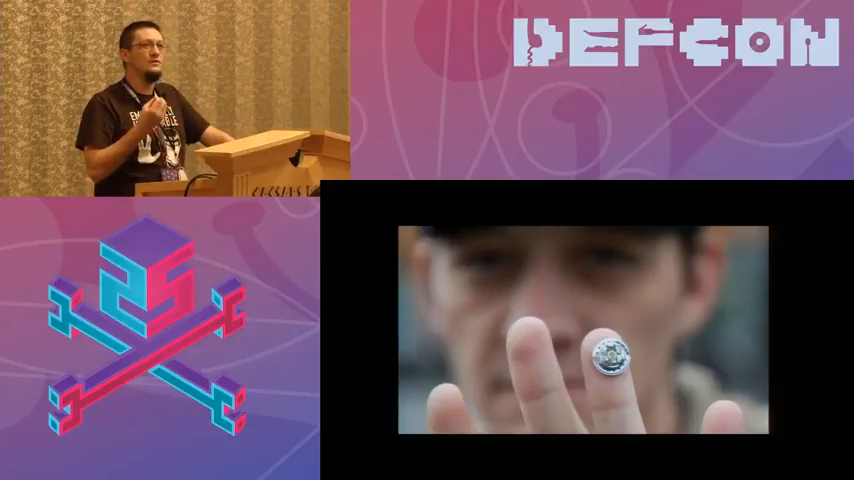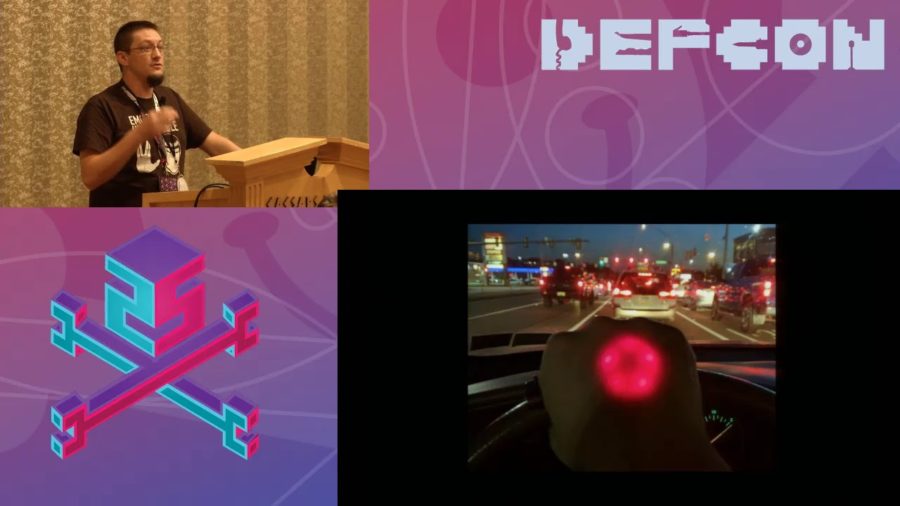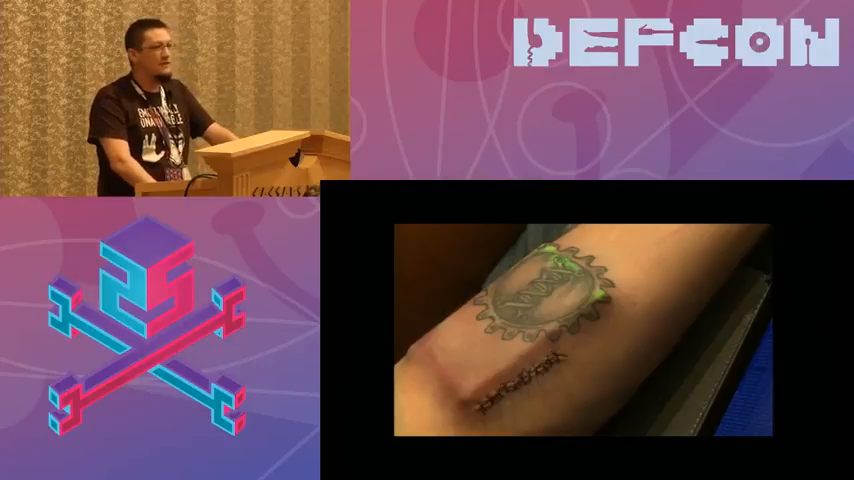Tim Cannon: My name is Tim Cannon, and I’m a cofounder of Grindhouse Wetware. We do basically low-cost implantable technology. We started doing this about five years ago. And this is something that I’ve had kind of a passion about for a long time. As a kid, I read a lot of science fiction, right, and particularly cyberpunk and where it focuses on the merging of man and machine. And it sort of emphasizes this idea that technology isn’t always going to solve all of the problems in the world, and that you have this kind of… High tech, low life is kind of the concept.
Now, I grew up reading this stuff, and I just thought it would be an amazing world if I grew up and this was available. Now, if you cut to say 2011, I started to read about people implanting magnets into their fingers and being able to feel the electromagnetic spectrum naturally. And to me this was fascinating. The idea of being able to gain a new sense was something that I couldn’t help but want to know about. And so I heard about this in April, and by May I had a magnet in my finger. And so this was something that I just absolutely had to take a deep dive into once I started to experience the things I was experiencing.
I ran around and started to enjoy my new sensory perception. However, once the novelty wore off, I started to realize I could probably begin to build devices to talk to these magnets and these sorts of things. And so as a result we started to build things like, so I took a sensor that took distance and I wired it into a microprocessor and created something that created a sonar sense. So it would ping me faster or slower based on whether things were closer or further away from the sensor. And using that I was able to pick this device up and actually navigate around my lab with only my magnet as my sensory organ. I would close my eyes, I’d be blindfolded, but still be able to walk around. I’d be able to feel the walls coming in through this new sensory organ that I had implanted in myself.

That’s a picture of the magnet sticking to a little speaker that we had just to kind of illustrate that I had it implanted.
So, once I started to do that and found out how low the actual difficulty was in building these sorts of things, we kind of said well, how far can we really take this on a hacker budget? And it turns out you can take it pretty far. As long as you’re willing to accept certain types of caveats.
So with about $1,500 and a group of people, we decided what we wanted to do was build a device that would be able to be wirelessly rechargeable. It would be able to take some piece of biological data. It would be able to kick that data out to the larger digital world. And be able to receive data back into it.
And so the Circadia was born. Now, if anybody in here— I would hope in a biohacking village we don’t have too many squeamish people. But just to prepare you that the slide… That was the device that I implanted in my arm. So, yeah I get that reaction a lot. It’s really large.
However, we were able to do this with almost no budget. And we were able to make something that was safely implantable into the human body. And it would kick out my temperature once every five seconds over Bluetooth. And then basically we had built a thermostat at my house so that when I got cold, my house would turn up, and vice versa. However, usability is something that we should all be interested in. Because when you go out for a cigarette in the winter, your house would just whoosh, you know what I mean? And my girlfriend would get kind of pissed off, so.
But we started to build these devices and realized that the potential for this was very high, and that the barriers for entry were actually lower than you would assume. You know, I think that the barriers are more in our minds. Now, with the size of this device, of course we got a large amount of criticism. But my argument tended to be there’s already YouTube videos on how to make something smaller. There’s already a whole engineering field on how to do this. What we don’t know is how to do this safely on a hacker budget. And that was the real success of the project, at least in my opinion.

This is a picture of somebody who we had built an LED implant, and basically if you run a magnet over the implant it would light the light for ten seconds. And this is me, I put it my hand. Bird, who also works with me and she’s here—she’s awesome. And then a guy named Russ Foxx who implanted it in his chest because he said it would be awesome to be like Iron Man. And I agree. I agree. It’s pretty awesome.
So we started to build these things and design things. However, when I got my magnet there was this great sense of like wow, I’ve got this new sense and it’s so interesting. But when I started to get exposed to all these different electromagnetic fields that I never knew existed before, I realized that I’m being bathed in these things constantly. However I had no idea, right. And so I was struck with a sense of blindness. I realized that the human body’s limitations are so severe. That we’re constantly being exposed to things—there’s a whole hidden world.
And the brain is a pattern recognition device. And the truth is the more data that you can throw into that pattern recognition device, the better patterns and the more clear and the more hidden features that you’re going to find in the world around you. And that actually adds to our ability to see things. I think it would be very interesting if there were some sort of magnetic anomaly, and all of a sudden it’s in some…you know Bumblefuck, Iowa, right. And then all of a sudden you have an entire tourism industry based on the fact that there’s some weird magnetic anomaly that nobody would have ever been interested in. I think that these sorts of things are very fascinating.
So, I think that one of the other things that really started to dawn on me as I started to investigate biohacking was that humans are an animal with predictable behaviors. And some of those behaviors maybe aren’t as useful as they used to be when we look at it from the context of the modern world versus the context of the Ice Age. And I think that we have currently, the philosophers are stuck in a sort of a holding pattern where really the questions that they’re asking are, Should we be doing this? Should we allow people to do this? Is it okay?
But I’d like to take this from a very different perspective. I think that we have a moral imperative to change the human being, given the fact that we are built so flawed and built for a time that we no longer live in. And I think society right now has a pretty… There’s a pretty pervasive belief that we kind of stopped evolving from the neck up. And that we don’t have behaviors that are actually stuck inside the human being, and ways in which we’re in this sort of evolutionary lockstep with what we used to be, and not what we are and what we’ve become. And we’re pre-biased to view things in certain ways. And there’s all sorts of things that biology will do to us and change the way in which we’re interpreting the world. And in that way I think we need to look at ourselves, as an animal, with predictable behaviors, and try to figure out ways in which we can change those behaviors in order to be more in line with the desires that we have.
I believe that what we would like to be is peaceful explorers who are trying to mitigate suffering in the world and [recording audio drops briefly] like to see. But I don’t think that we can do it in a monkey suit. I don’t think that we can do it in something like this. And I think that the planet has a load-bearing capacity for life. And we are well beyond that load-bearing capacity. And we need to figure out how we can change ourselves in such a way that we can begin to come into harmony with that before we begin to propagate to the rest of the galaxy.
I mean, if you consider the fact that it takes 2,000 calories for the average American to sit on their ass and make snarky comments on the Internet, it becomes very clear that we’re not very efficient. right. And so interestingly, we have all sorts of things— And so what I’d like to do is give an example.
A while back, they figured out—salesmen figured out—that you could give somebody a warm beverage. And if they’re holding a warm beverage in their hand, they’re more pliable to the tricks of various salesman. And this should be… I mean, there’s plenty of evolutionary reasons you can think of that if that that would be something that would develop a trust bond. However now it’s being used to exploit us. And in that way, we have to think of ourselves as an animal. If you dangle a carrot in front of an animal, you can get it to do all kinds of stuff, right. Horses just do horse things, until you harness them, right? and that sort of thing.
And so there are ways in which we can be exploited based on evolutionary behaviors, and this should be concerning to people because that’s not how it feels, right. When your brain delivers you a behavior, it never delivers you a behavior and it’s like, “Yeah, this is totally nor—,” it just feels like the right thing to do. You don’t feel like you’re being exploited.
And so blood sugar is another really great example of this. When your blood sugar dips low, you have a propensity to become more aggressive. So now let’s picture a computer programmer, and he skipped lunch and maybe he skipped breakfast, and he comes home, and at any given time he might be absolutely happy to hear the jubilance of his kids. But today, he yells at them. And he can’t figure out why. And after his dinner he’s thinking, “Man, why the hell was I so pissed off?”
Well, if you think about this in the context of the Ice Age, if your blood sugar goes low, you are about to have to choke something to death with your bare hands and then eat it raw. That requires a fair amount of aggression. More aggression than I really want to ever have to summon. And I don’t think that we understand that in terms of self-control, we tacitly accept all sorts of different talents that people have—mathematical talents, and athletic talents. However, we don’t tend to believe that there’s such a thing as say, moral talent, or the talent for self-control. These sorts of things.
And I think that when I look at the world, people tend to be tortured by their weaknesses, mostly because they don’t understand where they come from. They don’t understand that the brain is seated in those weaknesses. And I think we tend to think that evolution wanted us to become smarter and smarter and smarter. But the truth is intelligence is not good for biological life. It’s actually not nearly as helpful as we tend to give it credit for. And self-control additionally, is not good for biological life. In the Ice Age, if you were the type of person that would skip a meal, you were not going to last very long. And nature was the thing that the delimited us. Nature was the thing that allowed us to say, “Okay, well you just eat as much as you can. Have sex as much as you can. And we’ll handle it with war and famine and disease,” right, and this sort of thing.
And so, self-control is not good for biological life. And when you look at the anomalous people in the world who happen to have self-control, and then we tend to apply that back to the average human being. And then we say gosh, I wonder why we just can’t get our shit together. Well it’s because we think the anomalies and we say “anybody can do this.” But that’s not the case. That’s not the case.
And if you’ve ever known a drug addict in your life, you know that these people don’t want to do the things that they do. Now, I’ll make a small admission, is that I’m a recovering alcoholic. And I can remember looking in the mirror and saying, “Please, man. Just don’t drink today. Just today.” And come 2 AM, I spent the rent. I don’t know how I got there. And for a year after I got sober, I puzzled over this. Why? Why could I not stop? And this nagging feeling in my brain, and this sort of thing. And I can remember, finally the analogy came to me it’s like holding two heavy buckets of water out in front of you all the time. And then you decide to go have a drink. You haven’t even had the drink yet. You decide to go have the drink. And it’s like letting them buckets down. Ohhh, feels so good.
And so basically, biology is based on struggle. And as a result of that, it focuses on robustness. In other words, if we lost all of modernity tomorrow, and we lost all of our knowledge, we would go on. Because we know we want to have sex. And we know we want to eat. And we know we don’t want to share with people who don’t look like us. And that’s exactly how you end up going forward in a case where you don’t have modernity. And where you don’t have these sorts of things.
But if we had some sort of exponentially compounding advantage over other creatures, for a while we wouldn’t be able to notice it. For a while, it would take some time. We would still feel subject to famine and death and war and these sorts of things. And the thing is, that’s exactly what technology is. Technology is this exponentially compounding thing. However, we haven’t put ourselves in a context of something that needs repair. And so now we’re so far out of lockstep with nature that we can’t stop ourselves. We are monkeys with high-tech digital fiber optic cable and laser guns. It’s not safe to be that—I would never teach a monkey to use a rifle. But I’ve got a whole room full of monkeys who know rifles. It’s not good, right.
And so focusing on robustness is biology’s job. Which is why we need to divorce ourselves from biology. We need to transcend biology, in my opinion. Because how are we going to expect to get world peace if we’re all one skipped meal away from punching each other in the face? How can we have racial harmony when every single person in this room would fail the Stanford Implicit Racial Bias Test? Racism is a strategy—it’s a behavioral strategy. If you’re on the African savanna, what’s the best way to determine who you should share your resources with? “Do they look different than me? Then they don’t get to share.” This is something that should concern everyone in this room, because we’re designed this way. Evolution did this to us. We can’t just judge humanity on the good things. We need to stop pretending that we are perfect and that we are at the pinnacle of evolution. We need to look at ourselves in the context of what we really are.
Now, nature is completely indifferent to our success. Nature will be here when we’re gone, and that’s absolutely fine. And at the end of the day… George Carlin has this great quote that says the Earth doesn’t give a fuck about plastic. The Earth will strike a new balance. The Earth with plastic. It’s the people who live on the Earth that might have a bit of a problem.
Now, you guys might— I’m sure you guys know Bill Nye. He has a quote where he says, if you’re in a car— In terms of like our progress in saving the planet and this sort of thing. He says if you’re in a car and you’re careening towards a cliff, you should pump the brakes. And I agree with that. However, I prefer to think of it this way. If you’re in a plane and you’re careening towards a cliff, there’s going to be a point where you pass the ability to hit the brakes. However, if you accelerate you might actually be able to take flight. So I don’t know where we are in that process, but I do know that my preference is to fly. And that’s it. Thank you.

